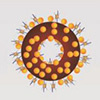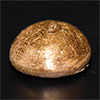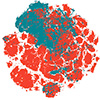Showing Spotlights 1 - 8 of 152 in category All (newest first):
 Researchers have developed a groundbreaking water harvesting device that combines a high-performance hygroscopic hydrogel with 3D-printed nanoporous silica, enabling continuous and efficient collection of clean water from air at an unprecedented rate.
Researchers have developed a groundbreaking water harvesting device that combines a high-performance hygroscopic hydrogel with 3D-printed nanoporous silica, enabling continuous and efficient collection of clean water from air at an unprecedented rate.
Jun 17th, 2024
 Magnetic nanomotors enable highly efficient capture and precise identification of emerging pollutants at part-per-trillion concentrations, offering a sustainable solution for water quality monitoring.
Magnetic nanomotors enable highly efficient capture and precise identification of emerging pollutants at part-per-trillion concentrations, offering a sustainable solution for water quality monitoring.
May 13th, 2024
 Researchers pioneered amyloid aerogels made from food waste that can selectively adsorb gold ions from electronic waste, then release pure gold nuggets. The circular approach sustainably valorizes two waste streams into new value.
Researchers pioneered amyloid aerogels made from food waste that can selectively adsorb gold ions from electronic waste, then release pure gold nuggets. The circular approach sustainably valorizes two waste streams into new value.
Mar 1st, 2024
 Scientists utilize discarded tea leaves for sustainable and affordable sodium-ion battery anodes to enable renewable energy storage.
Scientists utilize discarded tea leaves for sustainable and affordable sodium-ion battery anodes to enable renewable energy storage.
Jan 30th, 2024
 Researchers optimized oxygen vacancy-rich molybdenum oxide nanograins anchored on carbon fibers as an electrocatalyst, achieving record efficiency for the sustainable electrochemical conversion of nitrogen to ammonia.
Researchers optimized oxygen vacancy-rich molybdenum oxide nanograins anchored on carbon fibers as an electrocatalyst, achieving record efficiency for the sustainable electrochemical conversion of nitrogen to ammonia.
Jan 15th, 2024
 Researchers accelerate the discovery of organic electronic materials through data-driven design: curating 117K compounds with quantum-predicted properties to train ML models and enable ultra-large-scale screening.
Researchers accelerate the discovery of organic electronic materials through data-driven design: curating 117K compounds with quantum-predicted properties to train ML models and enable ultra-large-scale screening.
Dec 10th, 2023
 Researchers achieve 23% efficient perovskite-organic solar cells, using open-air processing for simpler, cost-effective production.
Researchers achieve 23% efficient perovskite-organic solar cells, using open-air processing for simpler, cost-effective production.
Nov 30th, 2023
 Researchers have developed an innovative nanotechnology material that can rapidly harvest clean drinkable water from air even in dry conditions via an integrated solar-powered cycle far outperforming existing technologies. Its exceptional uptake rate, capacity, release efficiency and durability promise major advancements towards mitigating global water scarcity.
Researchers have developed an innovative nanotechnology material that can rapidly harvest clean drinkable water from air even in dry conditions via an integrated solar-powered cycle far outperforming existing technologies. Its exceptional uptake rate, capacity, release efficiency and durability promise major advancements towards mitigating global water scarcity.
Nov 23rd, 2023
 Researchers have developed a groundbreaking water harvesting device that combines a high-performance hygroscopic hydrogel with 3D-printed nanoporous silica, enabling continuous and efficient collection of clean water from air at an unprecedented rate.
Researchers have developed a groundbreaking water harvesting device that combines a high-performance hygroscopic hydrogel with 3D-printed nanoporous silica, enabling continuous and efficient collection of clean water from air at an unprecedented rate.
 Subscribe to our Nanotechnology Spotlight feed
Subscribe to our Nanotechnology Spotlight feed





